JAPANESE MUSIC INDUSTRY
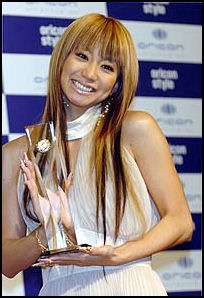
Kumi Koda wins an award Japan is the world's second largest market for music after the United States and much larger than any other country in Asia. Japanese record stores have amazing selection and Japanese consumers buy recordings from almost every genre of music, from opera to thrash metal. In the 1990s around 350 million CDs, tapes and other recordings, worth $5 billion, were sold in Japan each year.
Japanese Pop music tends to be very commercial and formulaic. Many artists are molded by producers and record companies, who follow music trends set in the United States and Europe, and take most of the money for themselves, leaving relatively little for the performers. Japanese pop has been compared to junk food ("easily accessible but ultimately not satisfying") and nothing represents this sentiment better than the domination of the Japanese pop music industry by idol singers (See Below). KJ, the front man of the hip-hop-rock group Dragon Ash told the Daily Yomiuri, “The music scene has always been dominated by idols, who just parade around, singing stupid songs for a buck. That why it will always suck.”
About 75 percent of the Japanese music market is domestic and 25 percent is international. One feature of the Japanese music scene is the fact that groups, singers, trends and fashion rise and fall with alarming speed. The year 1967 was the first time that domestic pop music releases exceeded imports. A big issue in the early years of popular music was whether to sing in English or Japanese. This issue remains an issue, with many songs having Japanese verses and weird English phrasing in the chorus.
Websites and Resources
Good Websites and Sources: Oricon Style (Japanese language site) http://www.oricon.co.jp/ oricon.co.jp ; Essay on J-Pop and Hip Hop aboutjapan.japansociety.org ; J-Music.com j-music.com ; Recording Industry Association of Japan riaj.or.jp ; Japan Zone on Popular Music in Japan japan-zone.com J-Pop Etcetera j-music.com/jpop ; Japanese, Chinese and Korean CDs and DVDs at Yes Asia yesasia.com ; Japanese, Chinese and Korean CDs and DVDs at Zoom Movie zoommovie.com ; CD Japan cdjapan.co.jp ; J Pop Asia jpopasia.com ; J-Pop Music Station lava.net/~raistlin ; J-Pop Bulletin Board jpopmusic.com ; J-Pop Artists : Namie Amuro namienewsnetwork.blogspot.com ; Morning Musume momusu.hatsukoi.org ; Hikaru Utada official site utada.com ;Ayumi Hamasaki official site avexnet.or.jp/ayu ; AKB48 akb48.co.jp ;Kumi Koda rhythmzone.net/koda ; Wikipedia article on Smap Wikipedia ; Arashi Pictures and Nothing Else livejournal.com/arashi_daily ;
Links in this Website: CLASSICAL JAPANESE MUSIC Factsanddetails.com/Japan ; WESTERN CLASSICAL MUSIC IN JAPAN Factsanddetails.com/Japan ; JAPANESE FOLK MUSIC AND ENKA Factsanddetails.com/Japan ; J-POP AND POP MUSIC IN JAPAN Factsanddetails.com/Japan ; J-POP AND POP ARTISTS IN JAPAN Factsanddetails.com/Japan ; ROCK IN JAPAN Factsanddetails.com/Japan ; PUNK, FOREIGN MUSIC, HIP-HOP IN JAPAN Factsanddetails.com/Japan ; YOKO ONO Factsanddetails.com/Japan ; KARAOKE IN JAPAN Factsanddetails.com/Japan ; DANCE IN JAPAN Factsanddetails.com/Japan
Good Websites and Sources on Japanese Music: “The Rough Guide to the Music of Japan” is a CD assembled by Paul Fisher, Short Introduction to Japanese Music asnic.utexas.edu ; Bibliography on Music in Japan aboutjapan.japansociety.org ;Traditional Japanese Music and Dance sfusd.k12.ca.us/schwww ; Wikipedia article on Music of Japan Wikipedia ; Performing Arts Network of Japan performingarts.jp ; Traditional Performing Arts in Japan kanzaki.com ; Hear Music, a World Music Store with a hearjapan.com ; Japanese, Chinese and Korean CDs and DVDs at Yes Asia yesasia.com ; Japanese, Chinese and Korean CDs and DVDs at Zoom Movie zoommovie.com
Artists and the Japanese Music Industry

Ayumi Hamasaki concert The Japanese recording industry is dominated by a few giant corporations, who pressure their artists to maintain an exhausting schedule of television appearances, interviews and concerts. Some artists-of-moment can be seen on television almost every night of the week.
The Japanese music scene is very disposable and forgettable. Songs rise up and down the charts with lightning speed and artist that are here today are just as quickly gone tomorrow. Artists usually try to score a hit with a single heavily promoted on television and on variety-show-style concerts with a half dozen or so performers. Pop singers and television personalities are sometimes referred to as talents.
Record companies with promising artists sometimes try to get the attention of the music press by dressing up their acts in chicken suits and sending them to the editorial offices of music magazines.
MIT Japanese culture professor Ian Condry has argued that the Japanese pop music industry is not very good at making hits but they are very good at taking a hit and exploiting it for everything they can and milking it for as much money as possible.
Sony Music is Japan’s largest record company.
Japanese Music Industry and the Foreign Market
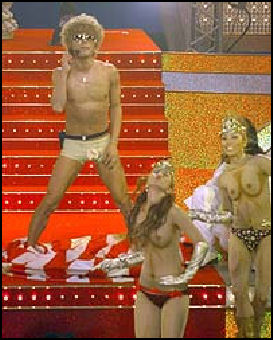
Crazy J-Pop TV scene All the artists you find in a Western record store you can find in at a Tower Records or Virgin Records in Japan: the Sex Pistols, Miles Davis, the Rolling Stones, Stravinsky, Peruvian flute music and Columbian salsa. You can also find Japanese who love music by these artists.
Western artists who have recorded for Japanese labels often are not as cooperative as Japanese artists. When Sony took over Columbia Records, for example, their executives pressured artists like George Michael to produce hit records at regular intervals, which caused Michael and other artist to rebel and try to get out of their contracts.
The Japanese record labels are bit reluctant to support their artists overseas out of fear they will lose their audience back home. Nearly all Japanese groups that have tried to win an audience in the United States and Europe have failed.
Many J-pop artists who have achieved a following abroad have done so through exposure via anime soundtracks. A producer at Sony told Japanese pop culture academic Roland Kelts, “Today, without anime soundtracks, we’re nothing. We need to [move beyond] anime.”
Decline of the Japanese Music Industry
The Japanese music industry has fallen on hard times in recent years. Sales declined almost 50 percent between 2001 and 2004. The industry has put part of the blame on imported CDs. In 2005, the sale of imported CDs was made illegal. Since 1998 the sale of CDs has declined steadily every year. Many young people don't even buy albums and singles, they rent them like videos from their local video store. Downloading music became mainstays of the Japanese pop music industry in the mid 2000s. Apple’s iPod had a 60 percent share of the portable digital music player market in 2005. In 2006, listeners were downloading the songs to their cell phones rather than iPods and PCs . By one estimate 90 percent of digital downloads were by cell phones.
According to the Recording Industry Association of Japan, the Yomiuri Shimbun reported, recording production (including CDs, records and cassette tapes) by the end of October 2011 dropped by 7 percent from a year earlier to 158.99 million, and the value dropped by 8 percent to 166.9 billion yen during the same period. Both figures will likely mark a year-on-year decline for the 13th straight year. But CD singles have done well, with production numbers up 10 percent to 34.8 billion yen from the 2010 January-October period. The figure is likely to exceed that of the previous year for the second straight year. Strong performances by Japanese and South Korean idol groups have led the way. The shift to digital terrestrial TV gave a bump to audiovisual equipment, and music videos also sold well. There was 53.4 billion yen worth of music videos produced during the January-October period, an 18 percent increase year on year.
In August 2011, thirty-one record companies — including Nippon Columbia Co., Universal Music LLC, Johnny's Entertainment Inc. and Avex Entertainment Inc.” filed for a ¥230 million yen in damages in a copyright suit against the operator of an Internet site enabling free downloads of music videos posted on YouTube. The record labels, filed the copyright infringement suit in the Tokyo District Court on Friday against MusicGate Inc., whose website exceeds 2.2 million a month and a massive volume of music video files have been illegally downloaded from it, negatively impacting the music distribution industry.
There are two pop music awards shows; The Gold Disc Awards, first given out in 1986 and awarded on the basis of sales, and the MTVJ awards. There are also a number of other hokey award shows like the Space Shower Music Video Awards. The winner of the international award one year for that show was the Moldovan pop trio Ozone with their novelty hot “Ko no Maiha”.
J-Pop
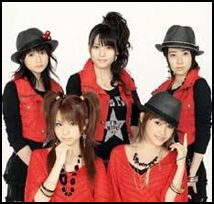
The term J-pop encompasses almost all genres of Western-influenced Japanese popular music. Since the 1970s, the commercial core of J-Pop has evolved along two contrasting lines : pop idols and the singer-songwriter genre. The term singer-songwriters refers to individuals or groups who perform songs that they have written themselves and covers a wide range of artists from a variety of musical genres. In contrast to pop stars, even if their songs are used, they rarely appear themselves on TV shows. [Source: Web-Japan, Ministry of Foreign Affairs, Japan]
Explaining what make J-Pop J-Pop, singer-songwriter Shinya Tada, the creator of hits such as AKB48's "Poni Teru to Shushu (Ponytail and Scrunchie)" and Arashi's "Mai Garu (My Girl)" told the Yomiuri Shimbun: “"It has a storyline to its lyrics and melodies. Within the parts of a melody, for example, it flows from verse A to verse B and then to the hook. On the other hand, in Western music, the hook often comes before the verse. The general approach of being modest at first and then taking the appropriate course of action is oh-so-Japanese, and this style of doing things can be seen in the music composition.” [Source: Takamasa Sakurai, Daily Yomiuri, December 7, 2012]
Tada respects the Japanese nature of "not being too assertive," a characteristic he sees as part of their creativity. "In music, performers play with sound by subtly increasing musical expression in ways that even critics can't detect. Japanese musicians create songs that can be loved by the masses, but at the same time, they add a little individuality to it. I think that's cool," he said. Takamasa Sakurai wrote in The Daily Yomiuri: That "cool" factor comes from the value and preservation of craftsmanship in an isolated country that blends various cultures into its own. And the contemporary musicians who have inherited that craftsmanship should go abroad more often.
Many Japanese pop songs have an English chorus and Japanese verses. Some Japanese believe that the Japanese language doesn't lend itself well to Western pop music because it often sounds fragmented. In any case, the lyrics often make no sense whether they are in English or Japanese.
Japanese Music Scene
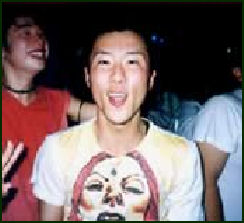
Japanese clubber In Japan you can find electronica, techno, idol singer pop, mainstream pop, punk, cutesy pop (characterized by campy girls groups), tsunami pop (a fusion of a number of different styles), rock, speed-thrash, glam rock, psychedelic, hardcore, thrash metal, hip hop, trip-hop, trance and other styles.
Describing the music scene in Japan, New York Times music critic Neil Strauss wrote: "There isn't a scene a Japan; there are hundreds of scenes...And most of them are aren't mere knockoffs. Singing in Japanese, English and 'Japlish' these acts have come up with a fusion of their own albeit one influenced by American bands."
On the pop music scene in Japan, Harvey Dickson wrote in the New York Times: “I have come to believe that serious musicians in Japan are kept in an archipelago of secret prisons for the talented. Japanese TV is afflicted with a permanent plague of Justin Bieberish boy bands, lip-syncing and busting hip-hop-like moves. There are reasons for this, including a powerful talent agency called Johnny’s, media concentration and the buying power of teenage girls. Whenever I’m visiting Japan and catch sight of a boy band on a giant outdoor screen (which can happen several times a day), I jab an EpiPen into my thigh loaded with a dose of Papaya Suzuki.” [Source: Harvey Dickson, New York Times, June 1, 2011]
Japanese Pop and the World
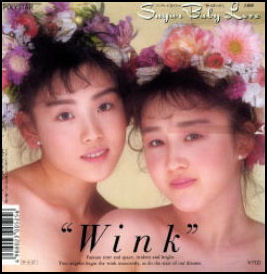
Wink, idols popular in the 1980s Many music critics and recording executives believe that Japan is going to be the source of the next big thing. One record company representative told the New York Times, "I think the next Beck or Paul McCartney is going to come from Japan. And I want to be the one who finds them."
Some pop music people believe that the combination of waning interest in foreign bands, easy access to musical instruments, an increasingly active and diverse music scene, and frustration by young people over their future and the poor economy has produced a fertile ground for potent new music.
The largest Asian market for Japanese pop-music is Taiwan, followed by Hong Kong, Singapore and Malaysia. Glay and Kinkie Kids have topped the charts in Taiwan, China and Hong Kong. Glay played before 35,000 fans in Beijing in October 2002. Tofu Records is a record label is dedicated to bringing J-Pop to the United States. It is supported by Sony.
On what makes some Japanese singers popular overseas music critic Issei Tomizawa told the Yomiuri Shimbun, "I think the popular artists all have an unique style that's strongly associated with Japan." According to Tomizawa, the reason why most Japanese rock and pop singers have yet to make sufficient headway in overseas markets is that their songs are too strongly influenced by foreign styles, and therefore, fans overseas feel these artists are Western copycats. [Source: Yomiuri Shimbun, December 30, 2011]
Hiroko Katsuragi, managing editor of Original Confidence magazine, agreed with Tomizawa that a unique Japanese style is the key to overseas success. In Europe and the United States, Japanese anime music genre groups, including visual-kei band, JAM Project, are gaining popularity. "Every year in Europe, the United States and other Asian countries, many anime-related events are held. Not only anime, but anime songs are also in big demand," Katsuragi said.
Popularity J-Pop in Asia in the 1980s and 90s
Melissa Kok wrote in The Straits Times, Japanese mania hit Singapore hard in the 1980s and 1990s, first with singers and actors such as Seiko Matsuda and Momoe Yamaguchi, followed by the likes of SMAP, X-Japan, Speed and Namie Amuro. Their posters and laminated photos sold briskly at retail outlets catering to idol-loving hormonal teens and young adults. [Source: Melissa Kok, Asia News Network (The Straits Times), April 26 2012]
Oshin, about the travail and triumphs of a Japanese woman from childhood through motherhood, was among the first huge Japanese drama successes in Singapore when it aired here in the 1980s, long before Korean matinee idol Bae Yong Joon was a twinkle in the eyes of his housewife fans here. Subsequently, Japanese drama serials such as Beach Boys (1997) and GTO: Great Teacher Onizuka (1999) fired up the small screen, even if it was in a language most Singaporeans could not understand.
J-Pop and Anime
Roland Kelts wrote in the Daily Yomiuri, “J-pop and J-rock's connection to anime has long been both a burden and an opportunity. In the 1970s and '80s, anime soundtracks were heavily localized to attract American viewers, just as the anime narratives were butchered to fit expectations shaped by Hollywood and television. [Source: Roland Kelts, Daily Yomiuri, December 23, 2011]
But in the late '90s and early 2000s, the Internet connected global fans to Japanese creators with an immediacy that transcended distance. An edited Pokemon or Naruto episode was no longer acceptable. Original songs, written and sung by Japanese artists, were prized as a sign of authenticity. American fans who knew no Japanese could still sing along with songs written and sung by Japanese bands.
Meanwhile, Japan's pop culture industries are facing an unpleasant but unavoidable truth: Growth at home is no longer possible. A chronically low birthrate and unstable economy guarantee that. And competition from South Korea and China is making Japanese pop culture producers increasingly antsy about their futures.
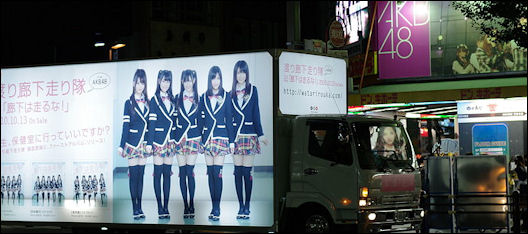
AKB48 truck advert
Can J-Pop Become Popular Overseas?
Takamasa Sakurai wrote in The Daily Yomiuri: Japanese rock and pop can't be successful overseas--that was the conventional wisdom in the 20th century among Japanese. Even the musicians themselves believed it. There are exceptions, of course. Late singer Kyu Sakamoto's "Sukiyaki (Ue o Muite Aruko)" once topped the U.S. charts. But it's still rare. It seems that Japanese musicians are far from being well recognized overseas. This diffidence has prevailed because many of those who are now in the music industry entered the business after being influenced by U.S. and British music like that of Elvis Presley and The Beatles. They believe it isn't easy to succeed in the countries where the music they admire originated. [Source: Takamasa Sakurai, Daily Yomiuri, December 7, 2012]
However, the situation seems to be changing in the 21st century. An increasing number of young people overseas have begun to declare themselves fans of J-pop, coinciding with the worldwide spread of anime, which uses music during opening and closing credits, as well as during the feature itself. Young people overseas have become interested in Japanese music through anime in the same way that they've become familiar with fashion and food through anime. Although they don't understand the language, they still enjoy the music. The phenomenon is similar to earlier Japanese fans who fully immersed themselves in Western rock and pop without understanding the lyrics.
The popularity of video sites such as YouTube has also contributed to the trend. Overseas fans can stay informed just as easily as Japanese audiences. On top of that, visual-kei rock bands--who don't reflect a foreign influence--frequently perform overseas. Their progenitors are bands like X Japan or Luna Sea, who have influenced them stylistically and technically. Such musicians don't suffer from negative self-comparisons to American or British musicians.
Singer-songwriter Shinya Tada, the creator of hits such as AKB48's "Poni Teru to Shushu (Ponytail and Scrunchie)" and Arashi's "Mai Garu (My Girl)" told the Daily Yomiuri Shimbun that the kinds of Japanese songs currently popular overseas have created musical categories that didn't exist before: idols and visual-kei. "That's why they're so popular. The phenomenon is similar to how Japanese felt they were discovering Western music," he said.
Tada says it's unfortunate that domestic J-pop culture isn't more in line with global J-pop culture. "Hardcore J-pop fans overseas seem to be aware of the quality of Japanese music more [than Japanese fans]," Tada said. "I often work together with musicians to better promote our music overseas. If we join forces, we can build the strength of the industry as a whole," he said.
K-Pop Beats Out J-Pop
On the popularity of Korean Pop (K-Pop), Takamasa Sakurai wrote in the Daily Yomiuri: Japan's cultural reach through pop culture such as anime and fashion have intensified globally. But another recent globe-circling trend I can't overlook is the surge of so-called Hanryu power--South Korean entertainment. K-pop has made a breakthrough in the global music market and many South Korean artists and groups frequently hold shows overseas and appear on TV. The South Korean music market is smaller than the one in Japan, so there's no choice for artists there but to venture into the global market. From there, K-pop has influenced a variety of fields, helping to boost the image of South Korean products.I've heard K-pop idols are used in Thai TV commercials for Japanese products. [Source: Takamasa Sakurai, Daily Yomiuri, November 23, 2012]
Over the last couple of years, K-pop idols from the South Korean music industry are making drastic breakthroughs, leaving Japanese idols far behind.For example, last year, when I stopped by a shop selling idol-related goods in Taipei, where live performances by Japanese artists are held year-round, the amount of goods on offer was about 70 percent South Korean versus 30 percent Japanese. But this autumn, the ratio widened to 9-to-1, based on my observations. On top of that, half of the Japanese goods were those from the two-dimensional world, or anime characters. [Source: Takamasa Sakurai, Daily Yomiuri, October 28, 2011]
A similar trend is seen in China and Southeast Asian countries including Vietnam and Thailand. Additionally, at a number of cultural events abroad such as Japan Expo, whenever I seek the source of girlish squeals, I almost always find my way to a booth showing music video clips of South Korean idols.
On why K-Pop groups are so popular, Ai Takahashi of the pop group Morning Musume: "Relatively speaking, South Korean idols have a stronger desire than Japanese idols to make their groups eternal, I think," Takahashi said. "A Hanryu star's passion for global success is stronger [than that of Japanese stars]. That's something Japanese idols don't care about enough.”
Takahashi's comments can be applied to the current Japanese economy, enterprises and the attitude that Japanese people have toward overseas markets. Whenever I go abroad, I feel the respect and adoration that people overseas have for Japan. Such feelings seem to have been sparked by anime and then spread to have taken root before Japanese even noticed them.I'm frustrated Japan has not fully taken advantage of the situation because of its inflexible approach toward international markets. This inflexibility seems to reflect the nature of Japanese as a whole--they frequently travel abroad but, in reality, cannot adapt themselves.
Takahashi said: "I want more people overseas to know about Japan's appeal and music. I believe there's a sound unique to our music. If there's a unique appeal of our music, we should exploit it overseas. "There must be many things that can only be created in the atmosphere of the Asian or Japanese [pop culture industry]. For example, the fact member's heights in a Japanese idol group vary can be seen as unique to Japan," Takahashi said.
Japanese culture can stay as it is. What's important is how to disseminate it globally. When I ask young people in China why Hanryu idols are so popular in there, I always get the simple reply: "Because they come here."
K-Pop in Tokyo's Korea Town
Akihisa Ota wrote in the Yomiuri Shimbun: "”Yoroshiku onegai shimasu [Please regard us favorably],”a group of four young male South Korean singers said in halting Japanese as they handed pedestrians flyers about their live show. A swarm of young Japanese women surrounded the entertainers when this scene occurred recently on Okubo-dori avenue in Shinjuku Ward, Tokyo. The area near JR Shin-Okubo Station is dubbed Korea Town. It is home to many Korean restaurants and shops, and amid the current South Korean pop culture boom such establishments are rapidly increasing in number. Many young women come to see ikemen (good looking) South Korean singers perform in Okubo venues. [Source: Akihisa Ota, Yomiuri Shimbun, October 17, 2011]
Local residents, however, complain that the bad manners of the operators and patrons of new businesses are making the neighborhood a less pleasant place to live. Particularly offensive, residents say, are littering and illegally placed signboards on the streets. The big draw of Okubo is that it gives fans of South Korean pop music, or K-Pop, the opportunity to see budding stars in person.
Narie Ishii, 19, a first-year university student of Matsudo, Chiba Prefecture, is one of the women who flocked to the singers mentioned at the beginning of this story. She wore a big smile after getting their autographs. "I like coming here to see South Korean singers because they talk very openly to their fans," Ishii said. "When I told my grandfather I was going to Okubo, he was surprised. He told me: 'Don't go there. It's dangerous.'" Ishii did not appear concerned.
Singers who perform at K-Pop live houses in Okubo often stand outside the venues before their shows, aggressively asking passersby to join the audience. Nobuo Suwa, 60, director of Shin-Okubo Shotengai Shinko kumiai, a local shopping promotion association, said, "The number of women in their teens and 20s coming to the area has increased dramatically this year."
Suwa said some locals find it irritating that the area's narrow streets are often crowded with K-Pop admirers.Some newly opened restaurants have begun placing signboards on public streets, angering local residents. Some restaurants leave plastic bags of garbage in places that are not designated garbage collection points.Some visitors to the area eat while walking down the street and litter the streets with packaging and other rubbish.
Local residents are fed up, and have begun complaining. Suwa said: "More new shops have opened here during the last year than in any other year in the past. They're welcome, but they even don't know how to put out the garbage properly. On top of that, cars are often blocked by signboards in the street, and there are so many pedestrians on the narrow streets."
K-Pop Outclasses J-Pop
Melissa Kok wrote in The Straits Times, Before Hallyu, or the Korean Wave, washed over Singapore, there was Japanese mania. These days, from Girls' Generation to Lee Min Ho and Kim Hyun Joong, it is almost all about Korean pop culture with Singaporeans - and it has taken only a decade for K-pop to not only erase Japanese pop culture's 20-year headstart, but surpass it considerably. [Source: Melissa Kok, Asia News Network (The Straits Times), April 26 2012]
Warner Music marketing director James Kang told the Strait Times: “J-pop has been slow in its growth to produce fresh sounds and superstar idols. Ever since the peak popularity of Ayumi Hamasaki and Utada Hikaru in the early 2000s, we have not seen bigger stars with 'idol influence' emerge from the land of the rising sun.”
“Japanese content 'was getting stagnant' while K-pop 'was starting to evolve with a fresher young pop sound'. Korean material seems more attractive, says Kang."Their music videos started to be striking and creative, and the stars are more exciting in image and music." Indeed, the Korean stars do not just perform watered-down versions of their concerts back home. When Girls' Generation and Super Junior staged their concerts here at the Indoor Stadium, they were grand, lengthy affairs with elaborate stage designs - even if the bigger stages meant selling fewer tickets.
“Even J-pop fans have become K-pop converts. Operations associate William Neo, 30, a J-pop fan since his teens, really got into Korean girl groups After School and T-ara last October. He says: "Their music is nice, performances are very good and all the girls are quite pretty - the whole packaging is good. "I used to listen to Namie Amuro, Ayumi Hamasaki, but then I lost track of them. In Singapore, they never promote their albums and you seldom hear about them on the Internet unless you really go and search for their songs.”
“Jason Ng, 31, a relationship manager in an investment bank, says he prefers the idols from Korea to Japan in recent years because of the 'difference in quality', which he attributes to more money and time being spent on grooming Korean idols.He thinks that a Japanese girl would be able to debut in a girl group such as AKB48 almost immediately "if she met the basic criteria of age and looks". "But the girls in Girls' Generation, I believe, spent about five years training their vocals and dancing after they had placed highly in a talent competition.”
“But die-hard J-pop fans such as National University of Singapore law student Alan Koh, 22, is optimistic that J-mania will survive the test of time. He says: "The interest in K-pop is just a passing phase. I think K-pop will always have its devotees, and the J-pop fan base has relatively lost its strength, but it's okay when everyone's not fighting with you for tickets to a J-pop concert.”
Why K-Pop Outclasses J-Pop
On why K-Pop outperforms J-Pop, Melissa Kok wrote in The Straits Times: Part of the answer lies in the example of Japanese rock band L'Arc-En-Ciel holding their first-ever concert in Singapore only after 20 years and selling 40 million records. The quartet - among Japan's biggest bands - told Life! they never came to Singapore before simply because they had no idea they had a following here. And it is quite a sizeable following too - a few categories of tickets to the concert at the Singapore Indoor Stadium are already sold out. Although local supporters say there is no official fan club established here, some of them are passionate enough about L'Arc-En-Ciel that they have flown all over the world to watch them perform at concerts.
“According to Warner Music marketing director James Kang, the fact that J-pop stars have always been more 'distant' and insular compared to K-pop stars played a part in the Korean takeover. He says even at the height of their popularity, girl group Speed, boyband SMAP, pop queen Namie Amuro, visual rock group Glay and current hot group Arashi gave Singapore shores a miss - so no fan meets, no concerts, no showcases.
“Japanese rock music fan Fabian Soh, 22, has also noticed that big-name Japanese singers and groups do not tour here as often as their Korean counterparts - a probable reason why they are not as popular. The library office administrator says: "You can definitely find people in Singapore who are crazy about J-pop now, but it's not easy as finding people who are very vocal about K-pop." A fan of underground J-rock bands such as Tokyo Pinsalocks and Sakanaction, Soh says he would probably have to travel to Japan if he ever wanted to see them live because there is "pretty much no chance of them ever coming here".
“In contrast, K-pop stars are less shy about stepping out of their country. To be frank, they are all too eager to promote themselves. Sometimes, it seems they are willing to go anywhere in the world for even the opening of an envelope, as long as it is an opportunity for more publicity and the price is right. Indeed, K-pop acts tour Singapore more often than the Japanese, with popular groups such as Girls' Generation, FTIsland and Beast having recently performed here.
“Not enough material for a full-length concert? No worry, there is always this thing called a ticketed fan meet. Last December, K-pop boyband TVXQ were in town for a two-hour fan party at the Singapore Indoor Stadium, where they sang a few songs, autographed merchandise and took photos with fans. Later next month, Korean idol Kim Hyun Joon, who played the princely Yoon Ji Hoo in the idol drama Boys Over Flowers (2009), will also be in town for a fan meet at the Indoor Stadium. More recently, the Mnet Asian Music Awards, one of the biggest star-studded annual K-pop awards events, was held here last November. It is still the clearest sign that the K-pop market has a strong foothold in Singapore.
“Assistant professor Liew Kai Khiun of Nanyang Technological University, whose research areas include television dramas and popular music in Southeast Asia, partly attributes the Hallyu revolution to the Korean government's push to promote all things Korean abroad.He says: "Unlike their Japanese counterparts, the Korean government and the media industry invest significantly in promoting the K-wave in the world as part of the efforts in strengthening the republic's soft power." In Singapore, the Korean government has previously organized and co-funded Korean pop concerts, and has supported the Korean Film Festival, which has been held here annually for the last five years.
“Exile, a vocal and dance group comprising 14 men, and the pop group AKB48 with about 48 female members became popular in the world of J-pop from around 2005. Exile had many fans among both young men and young women, whereas AKB48's fans are mostly men. AKB48 has a unique system of fan participation, and the appearance of individual members in the media is determined by fan voting. Another popular act, in the genre of techno-pop, is the three-person female group Perfume, which grabs attention with its unique dancing and vocals.
Image Sources: Japan Zone except clubbers (Japan Visitor) and AK48 (Wiki Commons)
Text Sources: New York Times, Washington Post, Los Angeles Times, Daily Yomiuri, Times of London, Japan National Tourist Organization (JNTO), National Geographic, The New Yorker, Time, Newsweek, Reuters, AP, Lonely Planet Guides, Compton’s Encyclopedia and various books and other publications.
Last updated January 2013
